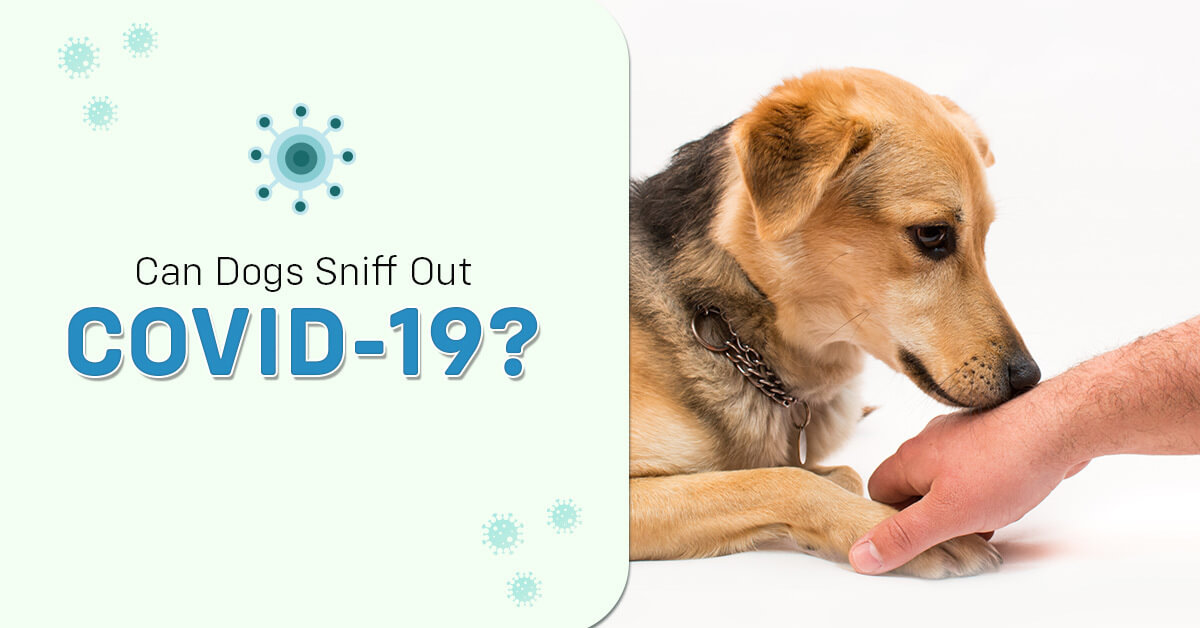It is difficult for humans to truly grasp the power of a dog’s sniffing abilities. We watch our own dogs sniff around the yard and on walks. We wait patiently for them to be finished with their analysis, wishing that they could explain to us what they see with their nose. We let them inspect us after coming home from places where we pet other dogs, a little flattered by their interest in who else we have been around. But limited as we are with our own substandard sniffing abilities, we really cannot fathom the extent of what our dogs can smell. In this blog post, we will examine the power of a dog’s nose, whether dogs can detect the Covid-19 virus, and if dogs can catch Covid-19 like humans.
The Power of a Dog’s Nose
A dog’s nose is quite incredible. Dogs have 300 million olfactory receptors in their noses, compared to our 6 million. Unlike humans, they breathe in through their nostrils and exhale out of slits on the sides of their noses. They also have a generous portion of their brain that is dedicated specifically to analyzing scents. Dogs also have a trait called neophilia, which is defined as a preference for novelty. When you put all these together, you realize that dogs have superhero-like scenting skills, and they love to sniff out new scents.
Dogs use their super sniffing skills in a variety of jobs. Dogs are used to detect the scent of everything from illegal drugs, explosives, and missing people, to bedbugs, termites, invasive snake species, and even fertile cows.
Dogs Sniff Out Medical Issues in Humans
Thanks to the vomeronasal organ, dogs are also invaluable at helping in the medical field. With that, Dogs sniff out medical issues in humans. According to Frontiers in Veterinary Science, “The vomeronasal organ is an additional site of odor detection that detects chemical signals that stimulate behavioral and/or physiological changes.” This organ is what gives dogs the ability to detect important physiological changes in humans.
Dogs can help detect medical conditions like blood sugar changes, migraines, seizures, and narcolepsy. Their ability to detect fear and stress has made them invaluable partners to military combat veterans with PTSD and people on the autism spectrum. Research also shows that dogs can sniff out certain types of cancer, including cancers of the breast, lungs, bladder, prostate, colon, ovaries, and cervix.
Can Dogs Detect Covid-19?
Because of their extraordinary sniffing skills, people have been asking the same question since the Covid-19 pandemic began: can dogs detect Covid-19? The answer is YES. Dogs sniff out the virus in humans.
Researchers have found that dogs can detect Covid-19 in humans. In one study, eight dogs were trained to recognize Covid-19 in the saliva and throat excretions of infected humans. The dogs correctly identified the samples as positive or negative with 94% accuracy.
In a different study, dogs could detect Covid-19 in the sweat of infected humans with a 95% accuracy, even when the human did not have any symptoms. In yet another study, the dogs identified two cases in which the lab tests for Covid-19 were false negatives, and the humans did have Covid-19.
Scientists are not ready to rely on dogs for Covid testing, although the dogs have proven to be extremely accurate. According to Nature.com, “Dogs in Finland and Lebanon had identified cases days before conventional tests picked up the virus, suggesting that they can spot infection before symptoms start.”
Although the dogs are accurate, researchers are not sure why the dogs can detect Covid-19. In an interview with Veterinary Medicine News, Professor David Dorman explains, “We don’t know exactly what they are responding to. It’s likely that they are not responding to the virus itself but may instead be detecting subtle odors that occur in people infected with the virus.”
Can Dogs Get Covid-19?
One of the biggest questions plaguing pet owners since the start of the coronavirus pandemic is whether our dogs can get Covid-19. According to the United States Center for Disease Control and Prevention, a small number of dogs have been infected with Covid-19, but the risk of it happening is low. Even though a dog catching Covid-19 is a minimal risk, the CDC recommends that dogs not interact with humans outside their family. People who are Covid positive should quarantine from humans and dogs alike.
According to the VCA website, dogs who have contracted the Covid-19 virus have not been symptomatic. In the unlikely event that a dog does contract the virus and show symptoms, signs of Covid-19 in dogs include fever, coughing, shortness of breath, sneezing, runny nose, vomiting, or diarrhea. Cats are believed to be more prone to getting Covid-19 from infected humans than dogs.
If dogs can get Covid-19 from humans, sending them into crowds of people is not a safe working environment for the dogs. In the test scenarios, the samples they sniffed were safely enclosed in metal containers. These containers protected the samples from being disturbed by the dogs and protected the dogs from being infected by the samples. If the dogs were to be put to work in airports or venues like sporting events or concerts, the dogs would not have the same protection as in the lab.
The Future of Dogs and Covid-19 Detection
Dogs have once again proven that their superpowers lie within the folds of their cold, wet snouts by being able to sniff out Covid-19. However, there is substantial training required to train dogs to detect scents. There are also safety considerations to take into account to protect the dogs from contracting the Covid-19 virus if put into service as Covid-detection dogs.









